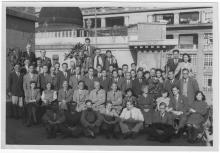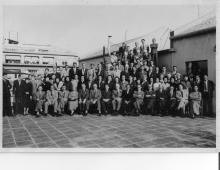Dates of birth & death from the Dictionary of Hong Kong Biography.
Thanks to an anonymous contributor for this brief review of Harry Ching's life:
Growing up in Australia
Harry Ching was born in Brisbane, Queensland in 1891 to a Hakka father from Shataukok and an English mother from Barnstaple, Devon. He was fourth of ten children.
As a schoolboy he won a scholarship to the Rockhampton Grammar School, but had to leave school at 15 in order to contribute to the family income. He went home to his father's sugar cane farm near Mackay, and found work as an errand boy, learning shorthand in his spare time. He then became a reporter for a Mackay newspaper.
Family tragedy
In 1911 his mother and five of his younger siblings were murdered by a disgruntled farmhand who was brought to trial and hanged in Brisbane.
The move to Hong Kong
In 1915 his father, in ill health, expressed a wish to return to his native village for his last days and Harry, the sole surviving son, accompanied him to Hong Kong. Harry found a job with the South China Morning Post as a junior reporter in 1916. In his younger days he was a keen cricketer and played regularly for the Chinese Recreation Club.
Promotion and family
When the SCMP editor, Thomas Petrie, left in 1924 Harry replaced him, and he remained editor for 33 years. In 1927 he married Ruby Irene Kong, from Sydney, and they had five children. He was appointed a Justice of the Peace in 1937.
Wartime Hong Kong
During the Japanese occupation of Hong Kong Harry had no regular employment. The South China Morning Post temporarily ceased publication, and he declined to work for the Japanese-run English language newspaper The Hong Kong News. He had odd jobs from time to time, including helping Sir Robert Kotewall with his memoirs, but for the most part he relied heavily on the charity of better off friends and on the sale of his possessions. He was arrested by the Kempetai in 1943 and briefly incarcerated in the gendarmerie located in the Le Calvaire Convent in Happy Valley.
Later life
He was made an Officer of the Order of the British Empire in 1950 and retired in 1957.
You can read more about Harry Ching's experience of Hong Kong during the Japanese occupation in his wartime diary:


Comments
Harry / Henry Ching
I've seen Mr Ching is sometimes referred to as Henry (more often in Hong Kong sources) and sometimes as Harry (more often in Australian sources). I asked his son, also named Henry, about this. He replies:
My father’s correct name was Henry. But he was known as Harry by his friends and colleagues in Hong Kong, and he was usually called Harry in Australia where he grew up. Henry was a popular name amongst the family of his mother – her father was Henry Crang, born in Bishops Tawton in Devon. When I sent you my father’s diary I referred to him as Harry because I thought this might help in ensuring that I was not identified as the diarist – much too young at the time!
Charles Ching
Charles was Harry/Henry's son, not his father. Charles was an eminent barrister (QC) and later one of the first judges of the Hong Kong Court of Final Appeal.
re: Charles Ching
His father was also named Charles:
https://www.couriermail.com.au/news/queensland/mackay/surviving-family-…
Father of Dorothy May Ching?…
Father of Dorothy May Ching?
https://eresources.nlb.gov.sg/newspapers/digitised/article/freepress195…